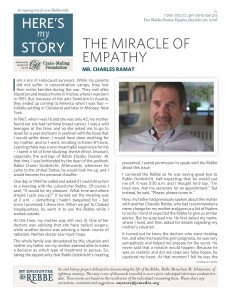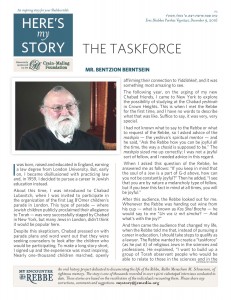The Miracle of Empathy
I am a son of Holocaust survivors. While my parents did not suffer in the concentration camps, they lost their entire families during the war. They met after liberation and made a home in Vienna, where I was born in 1951. But, because of the anti-Semitism in Austria, they ended up coming to America when I was four – initially settling in Cleveland and later in Monsey, New York.
In 1967, when I was 16 and she was only 42, my mother found out she had terminal breast cancer. I was a wild teenager at the time, and so she asked me to go to Israel for a year and learn in yeshivah with the hope that I would settle down. I would have done anything for my mother, and so I went, enrolling in Keren B’Yavne. Learning there was a very meaningful experience for me – I spent a lot of time studying Jewish ethics (mussar), especially the writings of Rabbi Eliyahu Dessler. At that time, I was befriended by the dean of the yeshiva, Rabbi Chaim Goldvitcht. Afterwards, whenever he came to the United States, he would look me up, and I would become his personal chauffeur.
One day in 1969 he called and asked if I could drive him to a meeting with the Lubavitcher Rebbe. Of course I said, “It would be my pleasure. What time and where should I pick you up?” It turned out the meeting was at 2 a.m. – something I hadn’t bargained for – but since I promised, I drove him. When we got to Chabad Headquarters, he went in to see the Rebbe while I waited outside.
At this time, my mother was still very ill. One of her doctors was advising that she have radical surgery, while another doctor was advising a harsh course of radiation. Neither doctor saw much hope.
The whole family was devastated by this situation and neither my father nor my mother seemed able to make a decision as which type of treatment to pursue. So, taking the opportunity that Rabbi Goldvitcht’s meeting presented, I asked permission to speak with the Rebbe about this issue.
I cornered the Rebbe as he was saying good-bye to Rabbi Goldvitcht, half-expecting that he would put me off. It was 3:30 a.m. and I thought he’d say, “I’m tired now. Ask my secretary for an appointment.” But instead, he said, “Please, please come in.” (more…)







